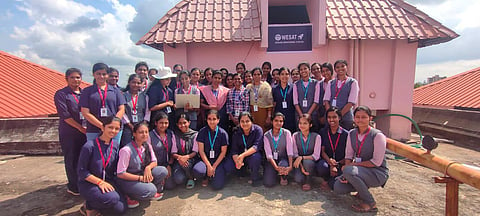All-woman team’s satellite gears up for spaceflight to study impact of UV rays
THIRUVANANTHAPURAM: WESAT (Women Engineered Satellite), designed and built exclusively by an all-woman team, is inching closer towards its space sojourn. Once it fulfils the parameters set by the Indian Space Research Organisation (ISRO), the satellite is expected to get a launch slot through the PSLV Orbital Experimental Module (POEM) platform sometime in November.
Built by the Space Club members of LBS Institute of Technology for Women in Thiruvananthapuram, the satellite will measure the extent of ultraviolet (UV) radiation in space and on the earth’s surface. The institution had signed an MoU with IN-SPACe under the Department of Space. ISRO’s lead centre Vikram Sarabhai Space Centre is providing guidance for the project.
IN-SPACe is responsible for promoting, enabling, authorising and supervising space activities of non-governmental entities, including building launch vehicles and satellites. The idea of designing and building the satellite was floated by the institution three years ago. A team of 30 students were drawn from various engineering disciplines. At present, the satellite is entering the fabrication stage.
“WESAT will help us understand the impact of UV radiation on recent phenomena such as heat waves and climate changes in Kerala,” Lizy Abraham, assistant professor and coordinator of the Space Club, told TNIE. She said a ground station for the purpose has already been established in the institution.
A satellite to monitor UV radiation was chosen as the state had only begun setting up such facilities on an experimental basis. The plan is to place the satellite in a 600-km orbit. Before launch, the satellite will be subjected to stringent tests by ISRO during which it will have to fulfil various parameters.
The Space Club spent close to Rs 10 lakh in designing and building the satellite. The fabrication involves additional expenditure of nearly double the amount. The institution hopes its initiative will get sponsorship or funding from the government or other agencies. Last year, ISRO launched AzaadiSAT, a satellite built by 750 girl students from across the country. AzaadiSAT had hitched a ride on the maiden flight of ISRO’s Small Satellite Launch Vehicle (SSLV).

